





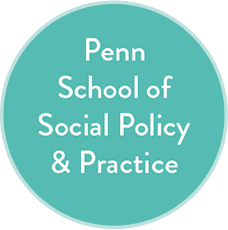
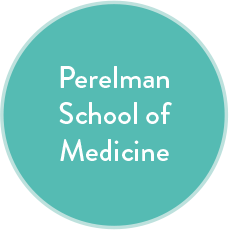

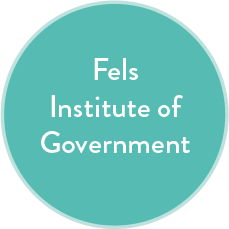

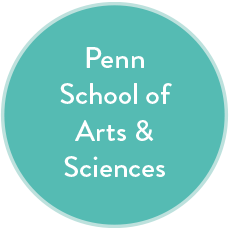


The University of Pennsylvania Carey Law School’s Future of the Profession Initiative recognizes a leading law school’s role in designing forward-looking lawyer formation and leading essential interdisciplinary conversations that respond to the fundamental changes that are transforming the legal profession. FPI will teach the skills and knowledge most relevant for modern legal professionals, lead broad conversations about innovative opportunities that abound in the dynamic legal profession, and transform the way legal services connect clients with more responsive systems.
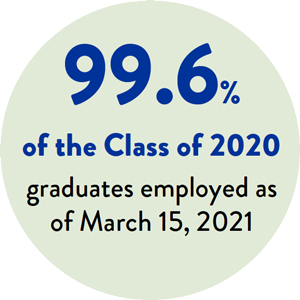
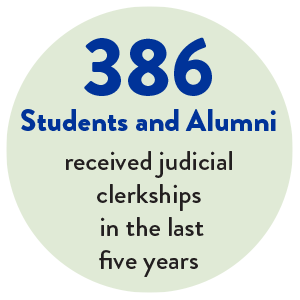
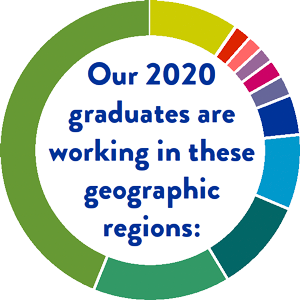
14.7%
10.1%
8.1%
4.3%
2.3%
1.9%
1.6%
1.6%
1.9%
9.3%
Pennsylvania
Washington, D.C.
California
Delaware
Illinois
Massachusetts
New Jersey
Texas
International
Other*
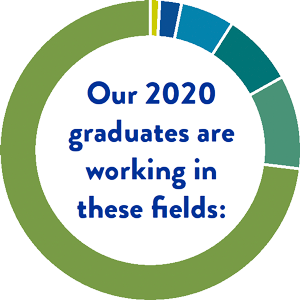

Our Pro Bono Program offers exceptional service-learning opportunities for all students, featuring more than 20 projects across six practice areas and a Mobile TEAMS Initiative that connects students to clients near and far. Through our Public Interest Programs, we engage, educate, and support students who desire to utilize their law degrees to pursue a more just and equitable world. Via flagship initiatives like the Toll Public Interest Scholars, the Toll Public Interest Fellows, and the TolLRAP, we provide leading financial support to ensure our graduates can actualize their public sector goals. The Leo Model Foundation Government Service & Public Affairs Initiative prepares students for leadership in government and policymaking.
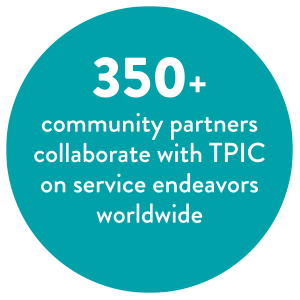
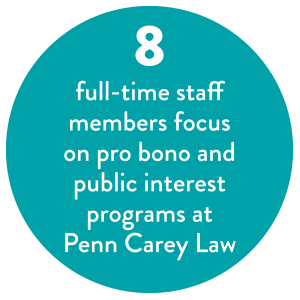
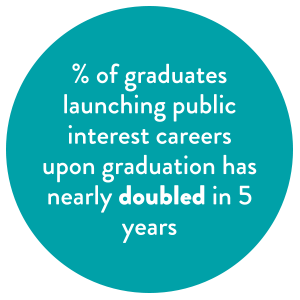
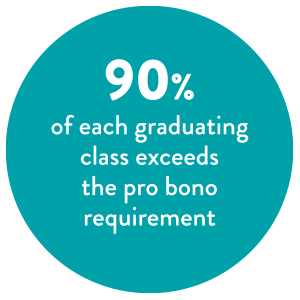




enn Carey Law is at the forefront of global legal education. Whether you’re interested in corporate law or human rights, intellectual property or arbitration, Penn Carey Law offers critical opportunities to study, work, and research around the world. Here on campus, we regularly host discussions and institutes on cutting-edge legal issues with distinguished foreign scholars, policymakers, and influential figures from global multilaterals. Through our study abroad partnerships with institutions like the London School of Economics, Sciences Po, Hong Kong University, and Hebrew University of Jerusalem, students engage transnationally in foreign, comparative, and international law and learn from different legal systems. The Law School also offers new and innovative research trips and seminars each year covering a broadrange of topics and geographies — from legal challenges for robotics and AI in Japan, to international humanitarian law in Colombia. Wherever you choose to launch your career, a Penn Carey Law education will prepare you for leadership in the law and in the world.


xperiential education lets students learn through the practical application of law. Through a diverse array of offerings ranging from live-client clinics to field placements and simulated lawyering skills courses, Penn Carey Law students learn what lawyers do, how they do it, and ultimately what it means to be a lawyer. These natural complements to the doctrinal curriculum root students in thinking like a lawyer, and real-life settings allow students to put those analytical and reasoning skills into action. In our eight in-house clinics, students are the “lead attorneys” representing clients under the close supervision of full-time faculty who are seasoned attorneys. In addition, through over a dozen field placements, students work as externs at various governmental agencies or nonprofit organizations, observing and performing a variety of legal functions outside the Law School. In simulation courses, students learn fundamental lawyering skills through case studies, hypothetical exercises, and real-world lawyering assignments. Students begin taking advantage of these experiential opportunities in their second year, and often take multiple courses that expose them to different practice areas and skill sets before graduation.

xperiential education lets students learn through the practical application of law. Through a diverse array of offerings ranging from live-client clinics to field placements and simulated lawyering skills courses, Penn Carey Law students learn what lawyers do, how they do it, and ultimately what it means to be a lawyer. These natural complements to the doctrinal curriculum root students in thinking like a lawyer, and real-life settings allow students to put those analytical and reasoning skills into action. In our eight in-house clinics, students are the “lead attorneys” representing clients under the close supervision of full-time faculty who are seasoned attorneys. In addition, through over a dozen field placements, students work as externs at various governmental agencies or nonprofit organizations, observing and performing a variety of legal functions outside the Law School. In simulation courses, students learn fundamental lawyering skills through case studies, hypothetical exercises, and real-world lawyering assignments. Students begin taking advantage of these experiential opportunities in their second year, and often take multiple courses that expose them to different practice areas and skill sets before graduation.



nclusion is core to our educational mission at Penn Carey Law. We strive to ensure a robust exchange of ideas and to foster an inclusive community where everyone can thrive, while offering focused support to members of our community from groups historically underrepresented in the legal profession. Students, faculty, and staff bring a wide range of backgrounds, experiences, and perspectives to Penn Carey Law. We learn from one another not only in classrooms, but also when we collaborate in student groups, journals, programs, and pro bono projects. Penn Carey Law provides a world-class legal education that values engagement across differences as integral to preparing graduates for legal practice in a diverse and complex world. Our Office of Equity and Inclusion furthers our ongoing commitment to promoting diversity, equity, inclusion, and engagement throughout Penn Carey Law and in the legal profession.

nclusion is core to our educational mission at Penn Carey Law. We strive to ensure a robust exchange of ideas and to foster an inclusive community where everyone can thrive, while offering focused support to members of our community from groups historically underrepresented in the legal profession. Students, faculty, and staff bring a wide range of backgrounds, experiences, and perspectives to Penn Carey Law. We learn from one another not only in classrooms, but also when we collaborate in student groups, journals, programs, and pro bono projects. Penn Carey Law provides a world-class legal education that values engagement across differences as integral to preparing graduates for legal practice in a diverse and complex world. Our Office of Equity and Inclusion furthers our ongoing commitment to promoting diversity, equity, inclusion, and engagement throughout Penn Carey Law and in the legal profession.
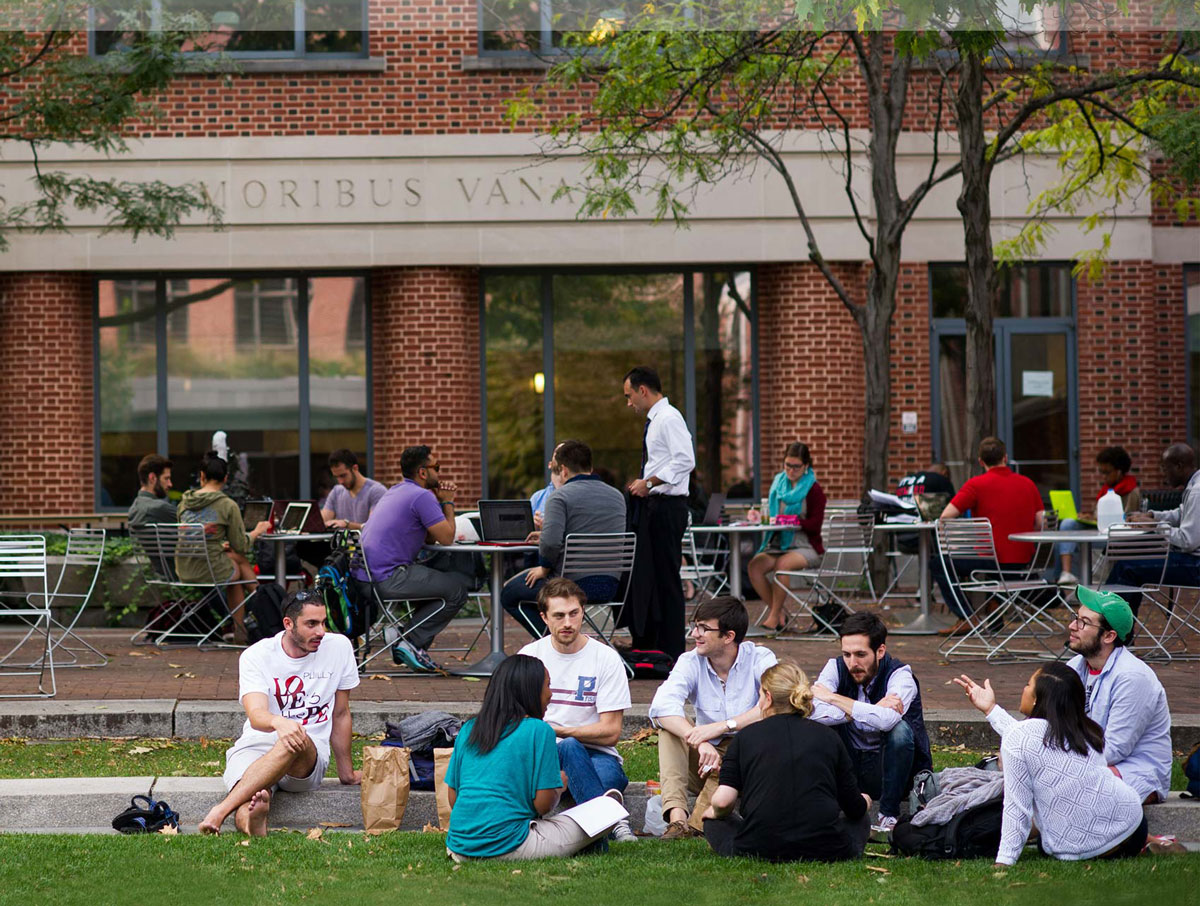

hiladelphia is the birthplace of the United States and a lively city full of arts, culture, and history — the perfect place for you to spend your law school years. Whether your interests are sports, the arts, or dining out, everything you need is just a short walk or subway ride away. Within the city, there are also a multitude of places to relax in the outdoors, immerse yourself in nature, and enjoy green spaces, from Penn’s Morris Arboretum, located in Philadelphia’s Chestnut Hill neighborhood, to Fairmount Park (a short walk from the Law School). Coming to Penn Carey Law puts you in the midst of a multitude of vibrant communities and all the city has to offer. Philadelphia is a place you can make your own.


ith over 100 named scholarships and more than 100 percent growth in financial aid over the past decade, Penn Carey Law is fully invested in your future. We are committed to guiding our applicants through the financial aid process and to helping our students develop a sound financial plan for their legal education. We provide generous financial assistance to qualified students through a variety of grants, scholarships, and loans. Importantly, admission decisions at Penn Carey Law are made without regard to an applicant’s financial need. Therefore, financial aid applications are reviewed only after a student has been admitted.
Penn Carey Law awards merit scholarships to a select number of students using a holistic approach that includes, but not limited to, academic achievement, leadership, service, and professional and life experience.
In addition to the aforementioned grants and scholarships, there are a variety of federal and private loans for which students may be eligible.
As part of our dedication to promoting the pursuit of public interest careers, Penn Carey Law also offers several sources of funding for select students who have demonstrated a commitment to public service and a generous loan repayment assistance program after graduation. Visit our website for detailed information regarding financial aid and scholarships, as well as instructions for applying: https://www.law.upenn.edu/admissions/financing/

ith over 100 named scholarships and more than 100 percent growth in financial aid over the past decade, Penn Carey Law is fully invested in your future. We are committed to guiding our applicants through the financial aid process and to helping our students develop a sound financial plan for their legal education. We provide generous financial assistance to qualified students through a variety of grants, scholarships, and loans. Importantly, admission decisions at Penn Carey Law are made without regard to an applicant’s financial need. Therefore, financial aid applications are reviewed only after a student has been admitted.
Penn Carey Law awards merit scholarships to a select number of students using a holistic approach that includes, but not limited to, academic achievement, leadership, service, and professional and life experience.
In addition to the aforementioned grants and scholarships, there are a variety of federal and private loans for which students may be eligible.
As part of our dedication to promoting the pursuit of public interest careers, Penn Carey Law also offers several sources of funding for select students who have demonstrated a commitment to public service and a generous loan repayment assistance program after graduation. Visit our website for detailed information regarding financial aid and scholarships, as well as instructions for applying: https://www.law.upenn.edu/admissions/financing/


Penn Carey Law’s program of legal education, combining our rich, interdisciplinary curriculum, varied co-curricular activities, and pro bono responsibilities, prepares our students for admission to the bar and to serve as effective, ethical, and responsible members of the legal profession. Each student will be able to do the following:
Demonstrate a core knowledge and understanding of substantive and procedural law in a number of different subject areas;
Engage in legal analysis and reasoning, conduct efficient and effective legal research, apply problem-solving skills, and present findings, analyses, and recommendations efficiently and effectively in both written and oral communication;
Work collaboratively;
Demonstrate an understanding of the interdisciplinary nature of law and the contributions and benefits to legal analysis and problem-solving that other disciplines can make;
Exercise proper professional judgment and fulfill ethical responsibilities to clients, the profession, and society in general; and
Utilize a range of professional skills that facilitate active, competent, and ethical participation in the legal profession.


Enrolled
Out of College One or More Years
Advanced Degrees
Women
Students of Color
LGBTQ+ Students
First Generation College
First Generation Professional School
Average Age
309
77%
11%
55%
48%
18%
14%
31%
24
75th Percentile
25th Percentile
173
167
3.96
3.56
*As of August 30, 2021
Philadelphia, PA 19104-6204
Financial Aid:
Fax:
JD Admissions Office Email:
Financial Aid Email:
The University of Pennsylvania values diversity and seeks talented students, faculty, and staff from diverse backgrounds. The University of Pennsylvania does not discriminate on the basis of race, color, sex, sexual orientation, gender identity, religion, creed, national or ethnic origin, citizenship status, age, disability, veteran status, or any other legally protected class status in the administration of its admissions, financial aid, educational or athletic programs, or other University-administered programs or in its employment practices. Questions or complaints regarding this policy should be directed to the Executive Director of the Office of Affirmative Action and Equal Opportunity Programs, Sansom Place East, 3600 Chestnut Street, Suite 228, Philadelphia, PA 19104-6106; or 215.898.6993 (Voice) or 215.898.7803 (TDD). The University’s annual security and fire safety report is available at http://www.publicsafety.upenn.edu/. The University of Pennsylvania must reserve the right to make changes affecting policies, fees, curricula, or any other matters announced in this publication or on its website.
